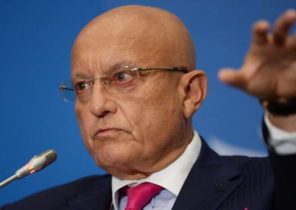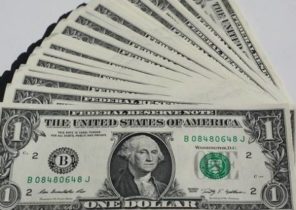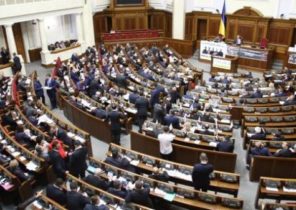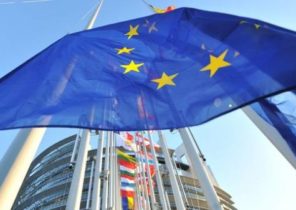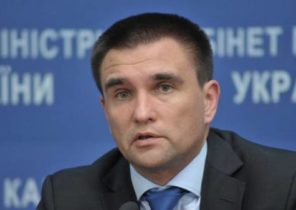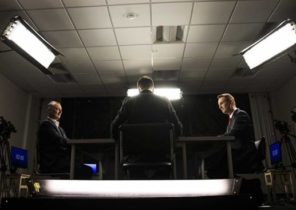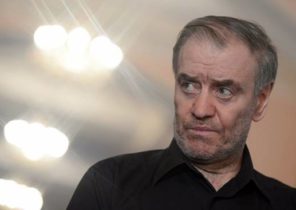
Recuperating from his wound Russian war veterans still hope to join the Eastern Ukraine to Russia. A report from their Association.
On the walls along the corridors hang pictures. With a smile on her face or in arms, alive or dead, the soldiers in the premium. On the shelves of the icons looking out for them, as well as the Russian flag, a map of the Crimea and “new Russia”.
All of this is in the heart of Moscow, the Union of volunteers of Donbass, which includes 10 thousand of the 50 thousand went to this Ukrainian region volunteers since February 2014.
These men (and some women) gather in the old a under office the apartment in a house in Pushkin square on the on-site restaurant and beauty salon. They come there for advice and help, but most of all — to communicate with friends. The newly-married couple co-workers even held a feast.
Prostheses and wheelchairs
“We offer assistance to these people it is often difficult to re-adapt to normal life” — explains Roman Lenshin. In the past he has commanded a battalion in the 2 thousand people in the Donbass and is now the head of this Association.
“I went first with humanitarian aid, he said. But when I realized that there Ukrainian Nazis burned our Russian brothers, took up arms.” His story repeats a common line of propaganda in Russia, where in the absence of real discussion about the justification of the authorities, no one doubt.
Established in August of 2015, the Association guides and supports back from the front of volunteers (often with injuries or even disabilities). It provides artificial limbs and wheelchairs, helps orphans and widows. Struggle with depression and alcoholism is also among the priorities. Is actively working to find housing and work, for the most part for the posts of security guards or builders.
Russian volunteers and Ukrainian soldiers
War leaves many wounds, both physical and psychological and financial. The Association helps not only Russian volunteers, but also Ukrainian soldiers, who hails from Kiev-controlled regions and are unwilling or unable to return home (so they take refuge in Russia).
“We live as we can,” says Yaroslav Ponomarev from Slavyansk, which the Ukrainian army holds after fierce fighting with Pro-Russian separatists in 2014. “We are not separatists and not bandits! resolutely he said, despite the lost look. We just defended our constitutional rights after the coup in Kiev”. “Slavic lives during the occupation, but one day I will be able to take you there freely,” he promises at a table in a Moscow cafe, lost in dark thoughts: if he gets home, he immediately put on handcuffs.
Yet he, like other refugees, are having a hard time: difficulties in obtaining securities, short jobs in construction, a limited budget, “to live, pay the rent, feed the family, dream to have a baby…”, sighs a retired soldier who was involved in the production of soap in his native Ukraine.
“Any money from the Kremlin”
In the Union volunteers claim that they rely only on private donations. “Any money from the Kremlin, — says Director Roman Lenshin. — Helps us guide large state-owned enterprises”, admits the President of the Association Alexander Boroday. Like Gazprom and Rosneft? Alexander goes to answer.
If the majority of the volunteers like Yaroslav Ponomarev can barely make ends meet, Alexander Borodai lives in a big way. He appoints a meeting in the restaurant of the prestigious Moscow shopping Mall and on the street waiting for his personal driver in the Porsche Cayenne.
If he has a close relationship with the authorities? He is again blowing a lot of smoke. He says he never met with President Vladimir Putin, but supports “direct contact” with Vladislav Surkov, “yesterday in the Donbass today in Moscow.” This shadow of the Kremlin Advisor almost three years the Ukrainian crisis and put the Russian initiative, the annexation of the Crimea and maneuvers in the Donbass.
“If Kiev wants war, I’ll be back”
Like other conflict-related leaders, Alexander Boroday got to the sanctions list of the West and faced with the ban on entry into the European Union. This Russian journalist and political analyst was at one time the Deputy Director of FSB on the information policy and special projects, participated in the Ukrainian crisis in the autumn of 2013 and in may 2014 became Prime Minister of the self-proclaimed Donetsk people’s Republic.
According to him, today, he devotes 90% of their time volunteers, and only about 10% of the family and the private consultant. “In the Donbass, I did what I had to. I haven’t been there since November 2014. But if Kiev wants war, I’ll be back,” he said.
As most of the representatives of the Russian nationalist elite, he vaguely comments on the present attitude to the peace process. The Minsk agreement? “They do exist. But I am against the Treaty with the enemy.” Ukrainian state? Error. Projects of the enterprises of Russia and new Russia, including Ukrainian regions like the Donbass? “The Kremlin no longer speaks of them because of the situation, but I’m not losing hope. This Association still remains our goal.”
A reserve of 10 thousand volunteers
The volunteer Union of Donbass came to light just within the framework of such thinking. “The Ukrainian nation has no history. It is doomed to failure. The Kiev regime will collapse like a house of cards. We want the Union with Russia, not Brussels,” — says Yaroslav Ponomarev. In addition, the Association is talking about a reserve in 10 of thousands of volunteers who are “always ready to return to the battle,” warns Roman Lenshin, though, and stresses that it’s recruiting.
In everyday life Director of the Association works as a specialist in local administrations. Anyway, he calls himself “a real Cossack ataman” and is proud that embodies the glorious tsarist past and the elite of Russia on the background of the perversions of the West.
Cossack paramilitary organizations got a second wind in Putin’s Russia, which included them in the army and was given great freedom of action in the missions outside the boundaries. “In the Donbass, I went with empty hands. This is a huge warehouse of weapons. We took it, mostly after the retreat of the Ukrainian army”, — says Roman Lenshin, who had to fight in Transnistria and Abkhazia.
According to him, among the soldiers “were only volunteers, vacation or retired military, but not a single Russian soldier or an instructor”. This contradict the reports of the independent observers on the direct intervention of the Russian army.
Benito, “blood brothers”
Thus, social programs in the Association is clearly political and even military purposes. Western journalist to be there is welcome, but not without suspicion. “You from whom?” — from the doorway asks me Italian Benito, who is considered here the “blood brothers”.
He fought in the Donbass, along with other foreigners, and now lives in Moscow out of fear that he may be held in Europe. Massage therapist by profession, he works for the Association and helps the wounded, in the hospital or at home. On the shirt and in the heart of the Benito printing of nostalgia for Mussolini. But his priority is “fighting Nazis in Ukraine. And their Western allies”.
Because, despite all the contradictions, he is convinced that Russia is cornered and must defend themselves. “We are ready! 50 thousand NATO soldiers lined up along the Western border of the country,” in one voice say, Benito and Roman Lenshin. Donbass is just one of the areas of confrontation, which, according to them, will only expand in the future.
— ———————————–
Donbass, frozen war
May 2014. In the East the blaze. May 11, separatists declare independence in Donetsk and Lugansk regions according to the recognized results of the illegal referendum. Kiev responds with the beginning of military operations.
July 2014. On the 17th the flight Amsterdam-Kuala Lumpur Malaysia Airlines shot out of the sky in Eastern Ukraine: the number of victims catasrophy is 298 people. The West accuses Pro-Russian rebels and imposing sanctions against Moscow.
September 2014. On 5 September, Ukraine and Pro-Russian rebels signed a ceasefire agreement in Minsk. Anyway, it is not respected and the fighting continues.
February 2015. Peace talks resume. The parties accept the settlement plan, the second Minsk agreement. However, promises are not fulfilled at this time. Although the intensity of the conflict subsided, the blood continues to be shed, and the peace talks not moving forward.
